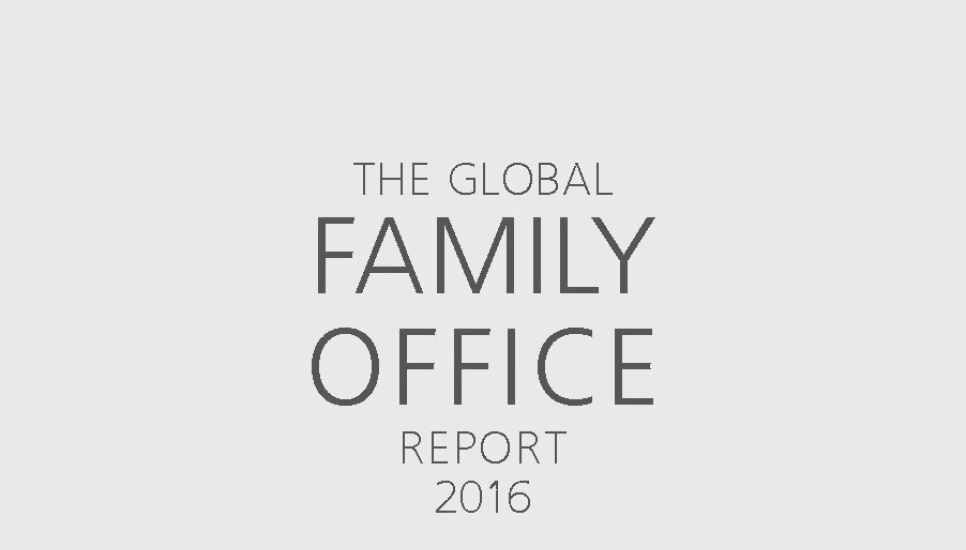Private equity, real estate, costs and succession among revelations in the Global Family Office Report 2016

Family offices continue to invest in private equity and real estate as they search for growth in challenging markets, according to exclusive new research released by Campden Wealth today.
The Global Family Office Report 2016 and its two annual predecessors, all presented in association with UBS, have been tracking “an inexorable shift” towards longer term investment in those assets, Philip Higson, Vice Chairman, UBS Global Family Office Group (pictured below), said.
“Because it plays to the strengths of the family offices, it links back emotionally to their ownership of operating companies, it has higher return, and it gives them a feeling of control, which they don't have when they look at their liquid market exposure.
“So I will just say that that multi-year trend continues, you see it in the numbers, and if it was not for the private equity and the real estate, they would actually have been down in the year rather than flat.”
The report found private equity allocations in the portfolios of family offices were up again on last year, despite data and commentary in last year's report cautioning family office principals about the challenges facing the asset class. Those challenges included the large amounts of money chasing private equity deals and the higher multiples being paid.

New data in the 2016 report revealed just 68% of family offices' equity holdings performed as expected in 2015. In addition, the number of private equity deals that family offices were involved in during last year was marginally down at five, compared with 5.1 during 2014.
Stuart Rutherford, Director of Research at Campden Wealth, said he and his team which produced the reports identified the issue of costs as another “fascinating narrative” over the years.
“We saw this big spike last year around costs and challenge the family office community around it. This year there was this growing cost-consciousness, there is some encouraging progress around costs. But it's very much front of mind in the community and that reflects the lower returns, reflects the higher cost.
The issue of succession weighed heavily on the minds of family office leaders and respondents were aware of the looming challenges, the report found.
“The numbers are quite stark there that 69% are going to go through a succession in the next 15 years,” Rutherford said.
“That will require huge amounts of energy and focus from the community to manage properly for the benefit of the families and for the future of the family office space that exists today.”
Rutherford said the big change in portfolios was another key finding from the report this year. The change involved growing allocations into private equity and part of hedge funds seen in portfolios 2015-2016, then the intentions going forward, which was for more of the same, for those two asset classes.
“I think certainly on the private equities side that reflects a multi-year historic trend into private equity, which is set to continue. And that's a really big fundamental finding.”
 Higson said the report revealed two issues around future intentions.
Higson said the report revealed two issues around future intentions.
"So the direction of travel as said, which is to go longer term and to accept the risk of illiquid investments, that's further explained by the recent performance of those allocations. They've done better. And so this shift away from hedge funds all plays to their strength not to have as much liquidity.
“But on the other hand there is a bit of, what I would call pro-cyclicality. What has recently not performed I am less excited about, therefore I reduce my exposure. But people have been disappointed with their hedge fund allocations in terms of returns.
"They've been happy with their private equity and real estate. So they take money out of the underperforming bucket and they keep adding it to the performing bucket.
"In the very long term that would lead you to have a portfolio that's a bit less well diversified. So you could say there are good and bad things. But I do think that recent performance of hedge funds has been a good, a very strong driver for taking money away. And that was a finding that we saw which was that, quite substantial shift out of hedge funds and into private equity and real estate.”
Phil Higson added, “In our experience the risk of disruption from a generational transition should not be underestimated. It is the number one reason for beneficial owners to make changes to their family office structure and management team.“
The data quoted in The Global Family Office Report 2016 comes from a quantitative, online survey of 242 family offices conducted by Campden Wealth between February and May 2016. The average AUM of participating family offices was $759 million, and the regional split was as follows: North America (32% of respondents), Europe (40%), Asia-Pacific (19%) and Emerging Markets (9%). The majority (75%) of respondents were single family offices.






